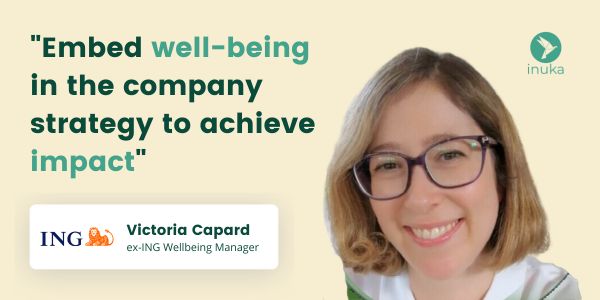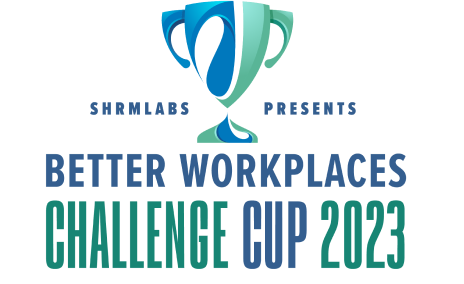[EN] “Embed Well-being in the company strategy to achieve impact” – Victoria Capard, ex-ING Wellbeing Manager, on integrating well-being as a way to drive business success

Victoria, you previously led Wellbeing at ING, and now act as an independent Well-being consultant. Please introduce yourself and tell us what drives your passion for well-being?
I am originally from Ukraine, grew up in Israel, and currently live in the Netherlands with my French husband. At a certain point during my career in the banking sector, I was confronted with my own limits due to an auto-immune disease. This forced me to change my lifestyle and to educate myself on what drives our personal well-being and how to improve it. I have been passionate about leaning into research regarding employee well-being and implementing best practice at ING.
How would you define employee Well-being?
I see that many organisations start to define well-being in terms of a list of categories, such as ‘physical, mental, financial, spiritual’ etc. However, I prefer to take a different angle and consider Well-being as a way to run a business.
Embedding Well-being in terms of leadership style, the definition of company purpose, the processes etc. It can be considered in a similar manner to the changes over the last decade related to companies considering their social impact in the community – where well-being is the internal translation of such a mind-set: The approach to taking care of the social impact on their employees due to work. Well-being therefore has to be embedded in the company strategy to achieve the desired impact.

How do you implement well-being as an integral part of a company’s strategy?
My view is that Well-being goals need to be defined and then embedded in the business goals. In my experience, large re-organisations are planned, yet there are almost always no people goals defined within the measures of success, only financial goals, or productivity goals. This needs to change since it completely misses the point that people are core to business success. With leaders juggling multiple priorities, it needs to be very clear that the well-being of people is business critical, and not a nice to have.
Often discussion relates to supporting employees to be more resilient, however I would flip that to consider, ‘how can organisations be more resilient?’ For example, how can leadership avoid caving to short-term pressure from shareholders and taking action which causes significant stress for employees? How can leadership resilience be strengthened, and leaders supported to be more adaptable?

Interesting perspective. What role do you consider an ROI plays in enabling scaled impact for employee well-being?
I believe that data is important, and you can do a lot with it. However, if you rely solely on ROI and the financial reasoning to focus on well-being, then you’re missing the point. The benefits from improved employee well-being are not linear but exponential. An ROI is a tool to ensure that the well-being topic resonates with management in their language, but the real impact comes from inspiring leadership to believe in well-being and what can be achieved through internal social impact.

As a well-being expert, what are your sources of information around the topic?
I’m a passionate leaner. I review research on the topic of well-being and I am following Well-being thought leaders on LinkedIn. I also learnt a lot from the research your co-CEO shared on effectiveness of employee well-being interventions. It’s important not only to read and take on learnings, but to implement the leading concepts. For example, we implemented the job demands and resources theory in the approach at ING through an extensive employee questionnaire to gain insight into what can support and what can harm employee well-being.
Our key insights were that role conflict, emotional demands, facing multiple stakeholders, unclear job expectations, and constantly changing demands were the key organisational ‘job demands’ causing stress, whilst a feeling of purpose, job fit, team support and manager support were all helpful resources in reducing organisational stress for employees. It’s critical to not only collect the insights to the root cause or organisational stress, but then to do something about it. It’s also important to recognise that these aspects are challenging to address, and difficult to change. Making positive change takes time and commitment.

You mention gaining insight via use of surveys. How successful was this approach and was it the main approach you leveraged to gain employee insight at ING?
The survey on job demands and resources theory was 100+ questions, and the completion rate was quite reasonable. Surveys need to be credible and the insights need to be acted on for the completion rate to remain high over time. We also found that ambassador networks were effective, especially for the 2-way interaction, both for gaining insights and for sharing communications on plans and progress. The question of how to gain insights into employee well-being in a large company, however, does still remain a struggle and is highly effort intensive.
The scan that Inuka completes as part of offering a coaching journey to all employees is a really elegant and integrated solution. The fact that it’s driven by the employee and not the organisation really helps, and it’s supportive to the coaching process for the individual. In addition, the real insight gold dust comes from the way that Inuka generate insights by aggregating themes from multiple coaching conversations, providing the careful balance of individual anonymity and confidentiality, whilst enabling the company leadership to gain deep insight to their true drivers of organisational stress without any extra work or questionnaires. It’s such a clever innovation. The employee gets access to unlimited, high-quality coaching and acts in their own best interest, whilst the company is able to gain deep insight and address root cause challenges. That’s a really smart and simple solution.

Do you experience any changes in Employee Wellbeing over time?
Overall, I see that the number of solutions available on the market have really exploded in recent years, yet people are not feeling better supported or more engaged. Overall management now start to recognise and acknowledge that there is a problem, which is a real positive advancement. It is now much more common to see white 50+ year old men are talking about Well-being, where before it was very much more taboo and stigmatised. Well-being is still a relatively new topic for companies. It needs a strategic mindset and time to build maturity and credibility.

What concluding thoughts do you have for HR and Well-being leaders?
Well-being starts with a dialogue to identify the challenges, what is needed, and then to implement proven and effective solutions that match the identified need. The most important aspect is to embed well-being within the culture. The approach needs to be simple and practical to win over management and get them onboard. There are three main aspects to an effective program. Quality coaching is a basic, like an office chair, which has to be in place, secondly, management support is required to embed Well-being in the culture, and thirdly, team interventions are helpful in addressing hot spots and team challenges. Overall, I am excited about the opportunity that companies have in making a real positive social impact for their employees!

Vond je dit interview interessant?
Via onderstaande knop vind je nog meer interviews met business leaders van verschillende bedrijven. Wil je de interviews in jouw mailbox ontvangen? Registreren kan ook via onderstaande knop.
Mogelijk gemaakt door Inuka Coaching, een #BCorp en value-driven organisatie. Vanuit onze wetenschappelijke grondslag zijn we leidend op het gebied van evidence-based, digitale en datagedreven oplossingen die meetbare impact hebben op de vitaliteit en veerkracht van medewerkers.
Als onderdeel van onze missie 'Everyone resilient’, streven we ernaar om waardevolle content aan te bieden om het strategische denken in het welzijn van werknemers te bevorderen en een levendig en groeiend peer-netwerk van leiders te faciliteren. Dit omdat we zo allemaal sneller leren en samen meer bereiken! Word lid van ons peer-netwerk van leiders gericht op welzijn, registreer je hier!
Vind je dit bericht interessant? Deel het met je connecties!


